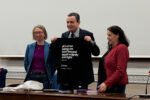Blerim Sallahu, Deputy Minister of Justice, has strongly criticized the Central Election Commission (CEC) following its decision to allocate a ballot number to the Serbian List for the upcoming parliamentary elections on February 9, 2024. Sallahu claims that the CEC violated the law by proceeding with the number draw for the Serbian List before the final ruling from the Election Complaints and Appeals Panel (PZAP).
In a statement posted on social media, Sallahu pointed out that under Article 130 of the General Administrative Procedure Law, administrative acts must be suspended until a decision is made by the higher body—in this case, PZAP. He argued that the CEC should have waited for the PZAP’s final decision before issuing the ballot number for the Serbian List.
“The CEC has violated the law again! The Vetëvendosje Movement (LVV) filed a complaint with PZAP against the CEC’s decision regarding the certification of the Serbian List. According to Article 130 of the General Administrative Procedure Law, the administrative act should be suspended until the higher authority, PZAP, rules on the appeal. The CEC violated the law by assigning the number to the Serbian List before awaiting PZAP’s final ruling,” Sallahu wrote on Facebook.
On January 6, 2024, the numbers for the political parties running in the upcoming regular parliamentary elections were determined. The draw saw the following results: Vetëvendosje (LVV) received number 118, the Democratic League of Kosovo (LDK) number 124, the Democratic Party of Kosovo (PDK) number 131, the Coalition AAK-NISMA-Conservative List received number 137, and the Coalition for the Family was assigned number 129.
Representatives from the Serbian List and Srbska Demokratka did not attend the draw for the February 9 elections. As a result, the CEC Secretariat drew the number on their behalf. The Serbian List ended up receiving number 112, but the absence of its representatives led to the number being drawn by CEC members.
On January 2, 2025, Vetëvendosje submitted an appeal to PZAP, challenging the CEC’s decision to certify the Serbian List for the upcoming elections. Vetëvendosje claims that the decision to issue a ruling in the name of the CEC, without formal approval from the commission itself, is a direct attack on Kosovo’s legal order, particularly regarding the Serbian List.
The CEC had certified the Serbian List for participation in the 2025 elections on the last day of 2024, following a ruling by the Kosovo Supreme Court that dismissed Vetëvendosje’s appeal. This ruling affirmed the PZAP’s decision to compel the CEC to certify the Serbian List’s participation in the elections.
The controversy surrounding the Serbian List’s certification continues to be a highly contentious issue, with political parties and institutions in Kosovo divided over the legality and legitimacy of the CEC’s actions.







